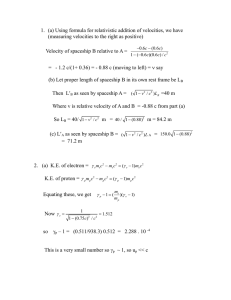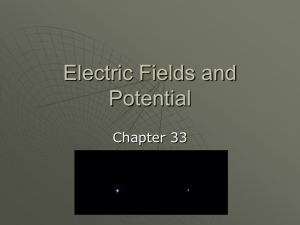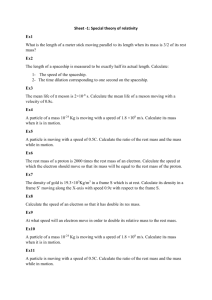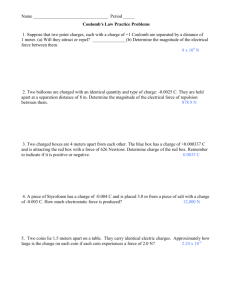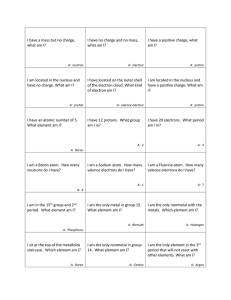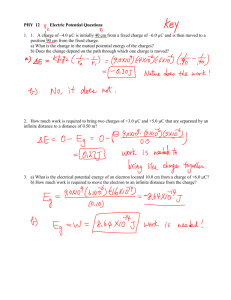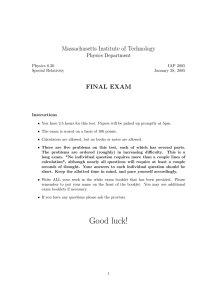Topics in Modern Physics Illinois Mathematics... Ch.26 Problems Name_______________________
advertisement
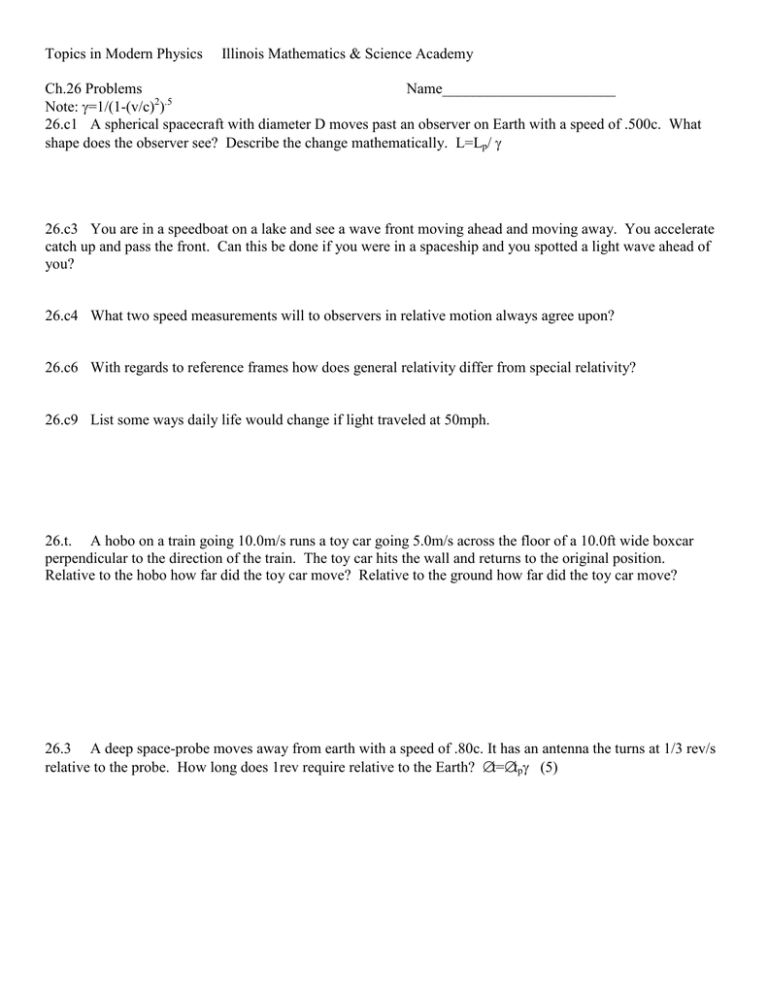
Topics in Modern Physics Illinois Mathematics & Science Academy Ch.26 Problems Name_______________________ 2 .5 Note: γ=1/(1-(v/c) ) 26.c1 A spherical spacecraft with diameter D moves past an observer on Earth with a speed of .500c. What shape does the observer see? Describe the change mathematically. L=Lp/ γ 26.c3 You are in a speedboat on a lake and see a wave front moving ahead and moving away. You accelerate catch up and pass the front. Can this be done if you were in a spaceship and you spotted a light wave ahead of you? 26.c4 What two speed measurements will to observers in relative motion always agree upon? 26.c6 With regards to reference frames how does general relativity differ from special relativity? 26.c9 List some ways daily life would change if light traveled at 50mph. 26.t. A hobo on a train going 10.0m/s runs a toy car going 5.0m/s across the floor of a 10.0ft wide boxcar perpendicular to the direction of the train. The toy car hits the wall and returns to the original position. Relative to the hobo how far did the toy car move? Relative to the ground how far did the toy car move? 26.3 A deep space-probe moves away from earth with a speed of .80c. It has an antenna the turns at 1/3 rev/s relative to the probe. How long does 1rev require relative to the Earth? ∆t=∆tpγ (5) Topics in Modern Physics Illinois Mathematics & Science Academy 26.4. If a group of astronauts travel to Alpha Centauri, 4.20 light-years away at .950c. How long does this take relative to an earth observer? How long does it take relative to the astronauts? How far do the astronauts calculate they have traveled? ∆tp=∆te/γ L=Lp/ γ (1.38,1.31) 26.5 Your friend goes zooming by in the same model spaceship you are flying. He says your ship is 19.0m long, the manual says it is 20.0m long. How fast is your friend flying? L=Lp/ γ 26.9 A muon formed high in the Earth’s atmosphere travels at .99c for a distance of 4.6km before it decays into and electron, neutrino and an antineutrino. How long does it live and how far does it move in its frame of reference? Find ∆t from earth = d/v, then use Earth’s perceived velocity by muon over ∆t. 26.13 A super train 100.0m long enters a tunnel 50.0m long going .95c. What does an observer see from a helicopter above the tunnel? 26.15 Extra Credit - In 1963 Mercury Astronaut Gordon Cooper orbited the earth 22 times at a height of 160km. How much younger was he when he landed than those people watching from earth. (note: since v<<<<c , 1/(1-x)1/2 ~ 1+x/2) Topics in Modern Physics Illinois Mathematics & Science Academy Momentum 26.17 An electron has a speed of .90c. At what speed will a proton have a momentum equal to at that of the electron? 26.18 Calculate the momentum of an electron moving at .01c, .50c, .90c. 26.19 An unstable particle at rest breaks up into two unequal fragments. The lighter fragment is 2.50x10-28kg and the heavier is 1.67x10-27kg. If the lighter fragment has a speed of .893c after the breakup, what is the speed of the heavier? Topics in Modern Physics Illinois Mathematics & Science Academy Relativistic Addition of Velocities 26.21 An electron moves to the right at .90c relative to an observer in the lab. A proton moves left at .70c relative to the electron. Find the speed of the proton relative to the observer.(.54c) vab = (vad + vdb)/ (1 + vad vdb/c2) 26.23 A Klingon spaceship moves away from Earth at a speed of .800c. The starship Enterprise pursues at .900c relative to Earth. Observers on Earth see the Enterprise overtaking the Klingon ship at a relative speed of .100c. With what speed is is the Enterprise overtaking the Klingons as seen by the Captain Kirk?(.357c) 26.24 A spaceship travels at .750c relative to Earth. If the ship fires a small rocket in the forward direction, how fast(relative to the ship) must it be fired to be perceived at .950c on earth? 26.27 Extra Credit. Spaceship I, which contains students taking a Mod Phys test, approaches Earth at .60c, while Spaceship II, with Mr. L moves away from the Earth at .28c. If Mr. L stops the exam after 50.0minutes have passed on his clock, how long does the exam last for the students? … to an Earth bound professor? Topics in Modern Physics Illinois Mathematics & Science Academy Relativistic Energy & The Equivalence of Mass & Energy Non rel. KE=1/2mv2 Relativistic KE= γmc2-mc2 Emotion= γmc2 Erest=mc2 Etotal=KE+mc2= γmc2 Etotal= mc2(1-(v/c)2)-.5 This is Einstein’s mass-energy equivalence. A stationary particle has energy proportional to it’s mass. (note: in other classes we have used joules(J) to represent energy. This unit is too big to easily express the energy of moving atomic and subatomic particles. We will often use 1MeV=1.60x10-13J. Also since these particles have very little mass we often use atomic mass unit(u)=mass of a proton or 1.66x10-27kg. A helpful conversion for this is 1u=931.494MeV/c2. 26.c.14 Which object in each pair of identical objects has more mass? Stretched or Unstretched Rubber Band, Bucket of hot water or cold. 26.28 A proton moves at .950c. Calculate (in MeV)its rest energy, total energy and kinetic energy. 26.32 Find the rest energy (in MeV) of an electron. Determine the energy required to accelerate and electron from .500c to .900c, .900c to.990c. 26.e.6 How much energy(J) can be derived from 1ml of water, converting it’s entire rest mass to energy? Energy and Momentum 26.34 An unstable particle with a mass equal to 3.34x10-34kg is initially at rest. The particle decays into two fragments that fly off with velocities of .987c and -.868c. Find the masses of the particles. 26.37 Two photons are produced when a proton and an antiproton collide and annihilate each other. What are the minimum frequency and the corresponding wavelength of each photon?(note: particles have zero velocity initially, E=fh, h is Planck’s constant 6.67x10-34Js)
